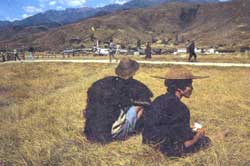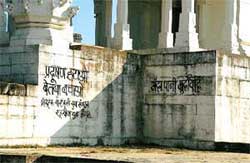The Assembly elections in Meghalaya are barely away, due only on March 3 Thus, the poll campaign is at its zenith with leaders of various political parties exploiting all possible options left with them in their efforts to woo voters. But, the average citizen, especially in the State capital, Shillong, at present seems to be more concerned about the volatile issue of uranium mining in West Khasi Hills district of Meghalaya than the upcoming elections. Indeed, the one and only reason for their growing anxiety is the Union Environment and Forest Ministry giving clearance, though conditional, last December to the Uranium Corporation of India Limited (UCIL) for going ahead with the proposed uranium mining at Kylleng-Pyndeng-Sohiong area in the district. With its nod coinciding with the ongoing poll campaign in the State, the one question that may arise in a curious mind is: Will the project at all materialise in the immediate future? Well, before trying to find an answer to it, all we probably need to do is on what basis or ground or how did the concerned Ministry feel it necessary to give the clearance to the UCIL to proceed with its plan. Broadly speaking, the manner the former has acted and granted the licence to the latter for uranium mining can barely leave anyone in doubt about the authenticity of its action. The entire process has been both legal and constitutional. The Ministry has, as reported, in the press, given its consent on the basis of the report of the public hearing on the proposed commercial uranium mining in the State's West Khasi Hills district, submitted by the State Pollution Control Board (SPCB). Therefore, under no circumstances, the Environment and Forest Ministry's action can be debatable and unconstitutional. If the Union ministry's action is looked upon as being lawful, what about the SPCB? Has it behaved in the similar fashion as the former? There are some people who are of the view that the report on the uranium mining submitted to the Centre by the SPCB after it carried out the public hearing on the uranium mining was far-fetched, groundless, and fabricated. Although it is an uphill task to infer who are right or wrong in this affair, if the newspaper reports on the outcome of the public hearing are to be believed, the SPCB could seldom recommend the Centre to give the permission to the UCIL to go ahead with the mining of uranium ores. What, however, has been unbecoming of the SPCB is that it had carried out the hearing when the situation in Khasi district was volatile following the influencial Khasi Student Union's weeks-long vigorous campaign aimed at mounting pressure on the Congress-led Meghalaya Democratic Alliance (MDA) government in the State to stop the hearing on the mining issue. The agitation began with their activists' two-day office picketing on June 4 last, and ended with the 36-hour bandh beginning June 11, crippling the normal life, especially in Shillong. Earlier, the student body had even reportedly given an ultimatum to the State government to scuttle it or face "agitation'. But, having skirted all these developments, the SPCB went ahead and held the public hearing as scheduled, on June 11 to garner public opinion on the proposed mining. It took place at Nongbah-Jyorin in the State's West Khasi Hills district, near Mawthabah, an economically run-down, somnolent village some 150 km from the capital. The hearing was though conducted by the SPCB as per a notification of the Union government under the supervision of the State government. No doubt, therefore, the SPCB was duty-bound to do so. But the point is that when sections of the people in the State were at that time up in arms against the proposed mining project at Kylleng-Pyndengsohiong in the West Khasi Hills region, was it not necessary on the part of either the State government or the SPCB to keep the process on hold for a future date in consultation with the Central government until the popular outcry died down, if not possible to cancel it for the time being. From it's modus operandi, it seems that the SPCB was under an illusion that in spite of the KSU's threat to agitation, most of those who would attend the hearing from the nearby villages would speak up for the project that would, in turn, enable the SPCB to prepare a favourable report, and send the same to the Union Environment and Forest Ministry. But, the entire exercise ultimately was one just contrary to their expectation. In fact, a majority of the people reportedly argued against mining. If that was what was the actual position of the public hearing, the question that arises in mind is how could then the concerned ministry issue such a licence to the UCIL for commercial mining without verifying it? Another question is why the Centre did hurriedly give the UCIL the green signal for the purpose when the MDA government in the State, the major partner of which is the Congress, itself is a house of contradictions and divided on the issue with two of its constituents, the Hill State People's Democratic Party (HSPDP) and that Khun Hynniowtrep National Awakening Movement (KHNAM), declaring their opposition to the mining long before, citing a likely health hazard, ecological disaster etc, as the reason for it, and, when the Assembly polls are just on the cards. This hasty move on the part of the Centre has triggered a deep sense of dissatisfaction among sections of people in the State. The Meghalaya People's Human Rights Commission (MPHRC) has already threatened to move the Apex Court in the country if the State issue a "no objection' certificate for the mining. If the Commission at all does so in the event of the State government giving the nod to the UCIL in the near future, there will hardly remain any valid reason for anyone to raise an accusing finger at it, simply because the MPHRC has before the public hearing on the issue last year cited the reasons for its opposition to the proposed mining, in a report to the Union Ministry of Environment and Forests, through the SPCB. But then, the Manmohan Singh-led UPA government at the Centre has showed a total lack of political shrewdness in this regard that goes without saying. After all the State Assembly polls are nearby, and his party, the Congress, is one of the coalition partners in the MDA government. It could have put it on hold till the elections. Now that the Centre has accorded environmental clearance to the UCIL for the mining, the State unit of the party is palpably in a quandary. It is because of this reason that the ruling Congress under DD Lapang is now desperately trying to bail out of any further controversy. It has asked the political parties to come up with their suggestions before the government decides on whether to allow the mining. But, unfortunately for the ruling party leadership all the political parties barring, indeed, its major ally United Democratic Party (UDP), have declared their opposition to the mining. Even the Congress's other two MDA partners, the HSPDP and the KHNAM, have also voiced their displeasure on the issue in the KSU-organised all-party meeting of January 12 last. All these developments, it is apprehended, may impact its showing in the upcoming polls to some extent, in the West Khasi Hills district, if not beyond it. If today there is uproar over the proposed uranium mining in the State slowly and steadily gaining momentum, or scepticism or even dread about its effects among sections of the people in the State, it is primarily the UCIL and the concerned ministry who are only to blame for this sorry state of affairs. Honestly speaking, the apprehension among the people, especially those from Domiasiat, a tiny village about 150 km from Shillong, mostly underprivileged and illiterate, with regard to serious health and environmental hazards at the site and its adjacent areas, began to grow ever since the UCIL had initiated the experimental mining there way back in 1991. It finished the job in 2005, after a long stint of 14 years. But during the period neither the UCIL or the Centre did care to do anything precious to clear the doubt from their minds. Had they at the very outset campaigned about its economic significance among them through print and electronic media in particular, or the good effects of the proposed commercial mining, by this time they could have gone ahead almost unopposed. But because of their laxity in doing so, they are palpably in quagmire. So is the ruling party too.














